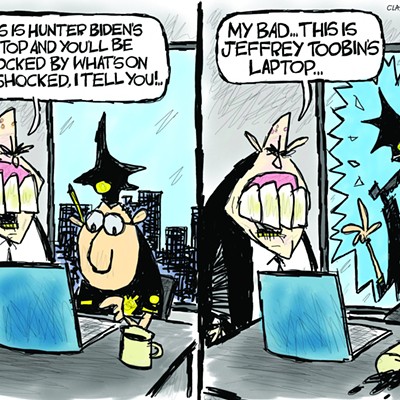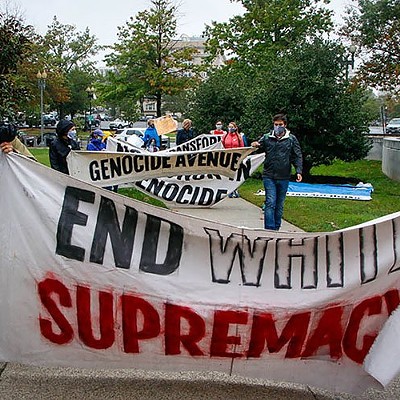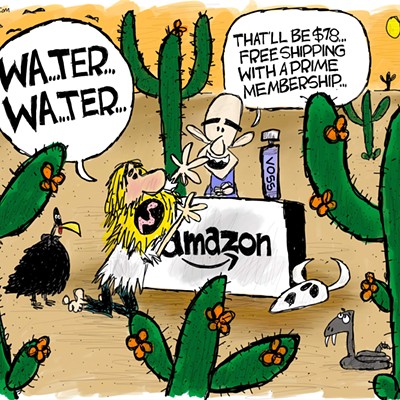Monday, February 16, 2015
DarkMatter Workshop Short but Worthwhile
The DarkMatter workshop was a success—if success can be defined as evoking thought and emotion from participants.
Entitled "Protect me from what I want: a workshop on race, capitalism, and desire," the just-over-an-hour workshop was well-focused on these topics, never getting too tangential. The queer transgender South Asian artist duo that comprises DarkMatter, Alok Vaid-Menon and Janani Balasubramanian, continuously challenged attendees to find the link among them.
Unfortunately, the group took a little while to feel comfortable sharing their deeper mediations. Just as the discussion was starting to really get interesting, the workshop was over. The short time didn't allow for full-fledged conversations about any of the topics, but rather short bursts of insight. Both Alok and Janani seemed to be aware of this, as they repeatedly mentioned that one workshop wouldn't result in everyone becoming political and social self-actualized leader activists. To be fair, the workshop had been heavily cut from the original length Alok and Janani usually run it for, per the organizer's budget restraints, I imagine.
Writing prompts with sometimes silly questions—"Describe your ideal milkshake or smoothie, with milkshake and smoothie being loosely defined"—managed to bring about spirited discussion about desires, what we like about them, and what we would want to change, which in turn led into questions about guilt, power and privilege.
[Keep reading for what Cali Nash took away from the workshop and a Q&A with one of the minds behind DarkMatter]
A few pieces of wisdom that stood out to me:
1. The dichotomy of language. How calling one thing beautiful implies that there are things that are ugly. How one group can only be in power if there are others without power that they have power over.
2. The importance of beauty in capitalism. It's no secret that the beauty industry and media representation warp beauty ideals and standards. Recognizing beauty as a tool for creating "haves" and "have-nots," which makes it easier to exploit the have-nots: it's less bad breaking fair labor laws or pushing mining deals in other countries where the people are not traditionally presented, and therefore perceived, as beautiful in American society.
3. Beauty as being fluid. How you can be beautiful in some contexts and spaces but not others. How a Latino woman can feel proud, resilient, strong and beautiful for her education and opportunities when she's with her family, most of whom didn't attend college. How those feelings can completely shift to ones of discomfort when she's on the actual university campus and seen as a minority that is discriminated against in the U.S. as not belonging and being poor.
Awkward moments happened. Silences when no one volunteered to share their opinions. Nervous laughter when one of the ice breakers asked participants to laugh in a crazed way (an attempt to break the construct of "professionalism.") The engagement and genuine connection by the end of the workshop made those little pauses worthwhile.
A quick question-and-answer round with one of the minds behind DarkMatter, Janani, provokes further thought.
Q: What are some of the goals of this workshop?
A: To offer a space for people to talk about the personal and political as one thing, and hopefully to give people a new jumping off point because the University is often one of the first places or the first place people are having these conversations in this very explicit way. So I guess we think of it as 'here are a different set of ideas to think about that are very old ideas but are put together in this specific way'.
Q: Why did you choose race, capitalism and desire of all the topics that could be discussed on this subject, and what makes their link so intimate that they can be addressed as one unit?
A: I think because beauty is totally a product of capitalism and vice versa. We often think about beauty as sort of 'she's born with it' and 'he's just beautiful naturally' are really flat. They don't account for the fact that beauty is actually a system by which we assess people's value and give them jobs or keep them free or grant them citizenship or not. Those are cyclical systems by which a lot of oppression is carried out and executed. So I think for us it's hopefully a way for people to bring that very very broad analysis to their own lives and individual moments.
Q: What do you hope both individuals that attended and larger communities get out of having a space like this?
A: On an individual level I hope that people got time to think about things in a way that they don't usually, which is a simple way of stating it but is really my hope as a facilitator because I don't have any grand ambition that one workshop will change people's lives. On a larger level I hope that it's something that people trickle out to their everyday conversations and that they think of politics and social justice as something that happens in every moment and not in specific moments of what we call activism or name as a visible type of political work.
Whether people will take the knowledge and integrate it into conversations or feel empowered to take on social justice roles is a decision that each individual will have to make. Janini's trickle-out theory, just like trickle-down economics, may take a while before it reaches those who need the message most.
Tags: review , DarkMatter , workshop , social justice , politics , queer , transexual , race , capitalism , desire













